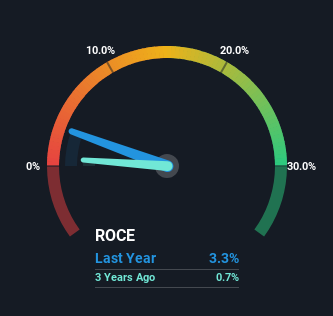- New Zealand
- /
- Infrastructure
- /
- NZSE:AIA
Capital Allocation Trends At Auckland International Airport (NZSE:AIA) Aren't Ideal

If we want to find a stock that could multiply over the long term, what are the underlying trends we should look for? Amongst other things, we'll want to see two things; firstly, a growing return on capital employed (ROCE) and secondly, an expansion in the company's amount of capital employed. Basically this means that a company has profitable initiatives that it can continue to reinvest in, which is a trait of a compounding machine. Having said that, from a first glance at Auckland International Airport (NZSE:AIA) we aren't jumping out of our chairs at how returns are trending, but let's have a deeper look.
Return On Capital Employed (ROCE): What Is It?
Just to clarify if you're unsure, ROCE is a metric for evaluating how much pre-tax income (in percentage terms) a company earns on the capital invested in its business. Analysts use this formula to calculate it for Auckland International Airport:
Return on Capital Employed = Earnings Before Interest and Tax (EBIT) ÷ (Total Assets - Current Liabilities)
0.033 = NZ$359m ÷ (NZ$11b - NZ$567m) (Based on the trailing twelve months to December 2023).
So, Auckland International Airport has an ROCE of 3.3%. Ultimately, that's a low return and it under-performs the Infrastructure industry average of 4.7%.
Check out our latest analysis for Auckland International Airport

Above you can see how the current ROCE for Auckland International Airport compares to its prior returns on capital, but there's only so much you can tell from the past. If you'd like, you can check out the forecasts from the analysts covering Auckland International Airport for free.
How Are Returns Trending?
In terms of Auckland International Airport's historical ROCE movements, the trend isn't fantastic. To be more specific, ROCE has fallen from 5.5% over the last five years. However, given capital employed and revenue have both increased it appears that the business is currently pursuing growth, at the consequence of short term returns. And if the increased capital generates additional returns, the business, and thus shareholders, will benefit in the long run.
Our Take On Auckland International Airport's ROCE
While returns have fallen for Auckland International Airport in recent times, we're encouraged to see that sales are growing and that the business is reinvesting in its operations. And there could be an opportunity here if other metrics look good too, because the stock has declined 15% in the last five years. As a result, we'd recommend researching this stock further to uncover what other fundamentals of the business can show us.
Auckland International Airport does have some risks though, and we've spotted 1 warning sign for Auckland International Airport that you might be interested in.
While Auckland International Airport isn't earning the highest return, check out this free list of companies that are earning high returns on equity with solid balance sheets.
New: Manage All Your Stock Portfolios in One Place
We've created the ultimate portfolio companion for stock investors, and it's free.
• Connect an unlimited number of Portfolios and see your total in one currency
• Be alerted to new Warning Signs or Risks via email or mobile
• Track the Fair Value of your stocks
Have feedback on this article? Concerned about the content? Get in touch with us directly. Alternatively, email editorial-team (at) simplywallst.com.
This article by Simply Wall St is general in nature. We provide commentary based on historical data and analyst forecasts only using an unbiased methodology and our articles are not intended to be financial advice. It does not constitute a recommendation to buy or sell any stock, and does not take account of your objectives, or your financial situation. We aim to bring you long-term focused analysis driven by fundamental data. Note that our analysis may not factor in the latest price-sensitive company announcements or qualitative material. Simply Wall St has no position in any stocks mentioned.
Have feedback on this article? Concerned about the content? Get in touch with us directly. Alternatively, email editorial-team@simplywallst.com
About NZSE:AIA
Auckland International Airport
Provides airport facilities, supporting infrastructure, and aeronautical services in New Zealand.
Adequate balance sheet with moderate growth potential.


